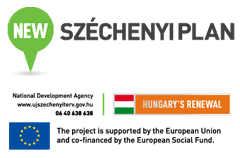In the frameworks of our research projects we intend to establish something new on a territory where our expertise has already been proved and we can contribute to the implementation of our task by a new methodology or technology.
ARRADIC
By way of launching the Information for All Programme (IFAP) project, UNESCO has made lots of enforcements in the last years aimed at the digital preservation of the cultural world heritage, at the preservation of physically damaged audiovisual materials (old films, early amateur moving pictures, early television documents and countless other rare and unique materials).
Digital archiving and document management
Digital archiving covers systematising, digital processing of databases of extremely various subjects meanwhile of very different logic and structure. It also encompasses eventual publication on an Internet portal of all materials that have been and are being continuously created at the research places.
Electronic Archives
In the framework of the project, the funding of the electronic archiving system, the assessment of the electronic data assets was carried out.
ICHEPIS – Inventorisation for a Cultural Heritage Periodic Information System
The direct objective of this two years long project was to define the scope and structure of relevant information and data that could provide flexible and user friendly information and knowledge management solutions of major importance for individual site managers, all States Parties, as well as for the World Heritage Centre of UNESCO, including their Advisory Bodies.
Methodology of a Simulation Modelling for Memetics by Knowledge Attributed Petri Nets
In our age, Memetic Communication has become the quickest tool of information dissemination, as being the only communication form reflecting authenticity by telling words to each other i.e. the Word-of-Mouth (WOM). Here we examine how messages are transferred from one mind to the other through human communication, instead of a central, outer manipulation or forcing people for a way of thinking.
Regional Well-being Research Project KTIA
The Foundation for Information Society and the BKF University of Applied Sciences have been jointly awarded a 300-million HUF funding from the call by the Research and Technology Innovation Fund. The research project aims at discovering the values of the countries of the Balkan region that may serve as a basis to formulate new concepts of tourism services focusing on preserving health.
The Development of PEN (Productivity Effectiveness Navigator), a decision supporting software
The task of PEN (Productivity Effectiveness Navigator), a decision supporting software is to create scenarios that are capable to efficiently manage situations and minimise damage in case of events related to the production (failure of equipment involving overhaul, shortfall of a supplier, logistical problems caused by natural catastrophes etc).
The effects of IT and network vulnerabilities on economy and society
The aim of the project is that the data obtained during existing and future cooperation carried out with The National Cybersecurity Center (CERT), should be compared to the secondary data sources reflecting the IT-knowledge of the national economy. In the framework of the primer research the project would assess the real effects of IT-vulnerability in the operation of the economic and public role-players and thus it would evaluate the effects that could be caused by the resulting risks and their inappropriate handling in the economic performance.
The Rural Farm House Museum Network project
The rural farm houses of Hungary are parts of an outstanding group of the Hungarian cultural heritage sites, they are on the World Heritage Tentative List of the country. In the course of the project we have, we have made a complete assessment and set up a digital data base in order to have a structured catalogue and a long term digital archiving option.











